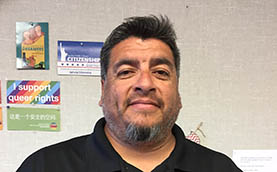Ernie Batrez
Ernie Batrez
Special Education at Summit Tahoma

Tell me about yourself and why you teach.
I enjoy working with kids. Teachers are really valued in my culture and I always liked the idea of teaching young people. Previously, I’d worked as a behavior specialist. While sometimes I’d only see small growth, I enjoyed helping the kids and empowering families to speak up for their kids.
Why do you teach this subject (Special Education)?
It matters to me personally to teach Special Education. I have a distant cousin with special needs. Back in the 80s, Special Education was not as widely available as it is today. I talked and played with my cousin often and it led me to volunteer at her high school and ended up working there for a summer. Other than those experiences, I terrorized teachers at my own high school. I thought I was funny. Now, as a teacher, I see the impact I have on families and students. I have the knowledge to do more. I love getting students to think about other things beyond their own experiences. For example, I have a very political student and through our conversations, I’ve challenged him to think differently. It’s part of the educational process.
What makes teaching at Summit different from other teaching experiences?
The personalized learning, mentoring, and focus on empowering students. For many students, they feel like their track is already made. They don’t always understand they can still impact their path.
Talk to us about your mentor group. How has mentoring changed your teaching experience?
This was a new concept for me. It is great that you can see and interact with students in a positive light and know you’re supporting them. Teenagers are often slow to warm up to adults. They demand authenticity, so it took a while to win them over, [but] it’s good now. It is great to talk with younger people, hear their concerns, and help them to address personal issues.
What has been your best moment as a teacher?
There have been a couple. The student I mentioned around politics. One day he said, “I like talking to you because it makes me think about things.” He was empowered to think on his own and I was a part of that.
What parts of your identity have been most salient to you as a teacher? How have these pieces of yourself helped you to connect further with your students?
My life experiences are something I’m able to discuss with my mentor group and connect with them as people. Sometimes we talk about current events and global issues. We talk about what’s happening beyond our community (San Jose, CA). Soon, these students will be voting, and I want them to have a deep understanding of how certain issues impact them and the world.
How does Summit support you as a whole person?
I’ve worked at other schools where they don’t ask you for your thoughts or opinions. Here they embrace all of our views and I feel part of a team — a whole team. I’m not just assigned an area or a person. I feel valued. As a whole community, we have a school and staff that are very mission-oriented and motivated.
Everyone feels energized to maximize what they’re doing. All of the teachers — both new and experienced teachers — pushing for the most they can get out of their students.
What would you tell a potential teacher interested in Summit?
It’s highly interactive and that can be intense. There are a lot of student interactions beyond teaching in the front of the classroom. There are students at your doorstep all the time, which can be both good and bad. I like that we have time, tools, and the flexibility to support students — even one who is struggling.
What’s been your biggest challenge as your teacher?
The paperwork! In my role as a Special Education teacher, I support learning in a number of classes. It requires coordinating work and expectations and goal-setting with lots of people.
Where do you see yourself long-term?
I definitely would like to retire as a teacher. Ideally, I would love to stay with Summit Public Schools. I hope to see my mentor group graduate.

